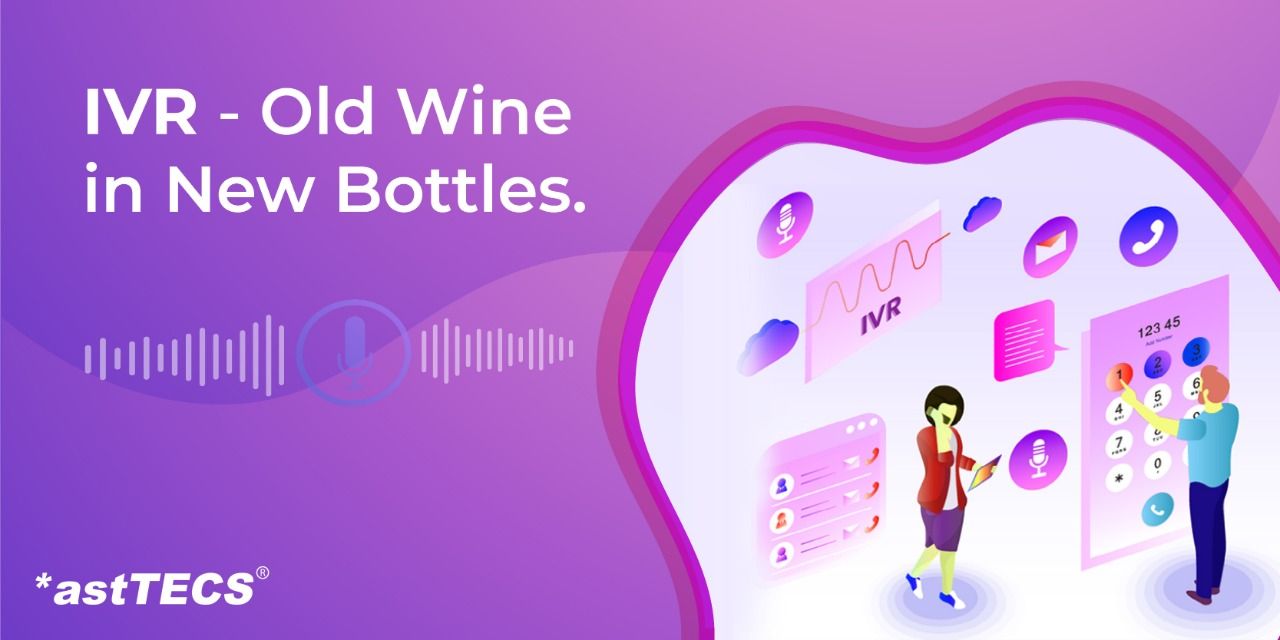IVR – Old Wine in New Bottles?
Introduction
Is that what the new frenzy of IVR is all about? It seems like that. But, that is not the truth. Customer service environment and technology is changing drastically.
And no, I don’t mean change from a customer point of view, but technology. For instance, just a few years back, IVR was only used to welcome and greet customers on a call making consumers feel reassured and appreciated.
But now, as we said, a lot has changed. It’s not just old wine in a new bottle, but a supremely beautiful product that holds not only good taste but a great value around it. It’s beyond just taped audio menu, it now adds value to the business and the customers.
IVR has come a long journey from just a call routing software to a data manipulation and retrieval tool.
So, Enough said, What is an IVR?
IVR, stands for interactive voice response, is a technology that allows businesses to connect with consumers using pre-recorded voice messages and DTMF / voice input through a keypad to automate inbound calls.
An interactive voice response system (IVR) interacts with callers, takes general details, and routes calls to appropriate agents. Simply, it lets consumers engage with a computer instead of (or in addition to) speaking with a human. This technology is used in conjunction with Automatic Call Distribution (ACD), which is commonly seen in call centres.
What are drivers for this change ?
– Increasing usage of APIs to gather information from various Databases and present it to the customer
The number of clients who do business online or use an online platform to make purchasing decisions has increased dramatically. In this way, it is important to deal with the strain of providing genuine customer assistance. Having a person devoted to acquiring data for a customer/caller is time-consuming. An API has become the new messiah in the development of Application effectiveness and a Pretty simple READ operation.
An IVR or let’s call it the IVR 2.0 can leverage the underlying API to make calls in the application and provide responses in the form of voice and text messages at a high rate.
Callers can get key info by calling your contact details and going through an IVR menu from outside typical business hours or when agents are occupied with other calls. It’s like having the ideal voicemail with the extra benefit of extending beyond the welcome and providing information relevant to the customer’s call.
As a result, IVR systems enable your consumers to solve their problems and receive the information they want without having to talk with a representative.
Added features in IVR like Voice input, Text to Speech, Speech to Text:
Quite Obvious, IVR before was just a robot and people were highly not interested to listen to it. If I were given an option to listen to that boring, dull and slow IVR voice, I would rather skip it too. The relevance of voice technology for customer support has grown. IVR now, allows you to leverage the power of speech to interact with businesses—for queries, orders, and delivery dates—all of which improve customer happiness but more humanly.
IVR validates the criticality of developing robust and effective interactive voice response and speech-based solutions that boost consumer self-service, satisfy customer needs and boost operational efficiency. IVR allows apps to come to life.
IVR demands to provide life like voices that have been trained on all use cases and conversations and can converse in any language as fluently as a real representative.
IVR currently employs sophisticated text-to-speech, speech-to-text and Voice Input technology based on recurrent neural networks, resulting in a considerably more human-sounding voice.
- Exceptional caller service
- Costs were cut by automating more calls.
- The ability to update your application with flexibility and control
- Create a unique voice experience for your company.
Increasing salaries of call center staff
Salaries of call center staff are increasing and there is no point in bearing the increased salaries for the work which can be easily automated. Some of the tasks like routing the calls to the department, feedback calls and market surveys can be easily automated using IVR solution.
Using IVR solutions businesses can eliminate an intermediary customer service staff or receptionist who was entrusted to route the calls to the correct agent. Adopting an IVR solution is simple to scale up without incurring major cost increases. As a result, IVRs are indeed a cost-effective solution to improve operational efficiency and agent productivity while also generating a high return on investment.
All the above game rise to a series of new applications. Let us go through a few scenarios:
Lead Generation with Voice Blasting IVR:
IVR voice blasting is a combination of IVR service and voice blast. It is a great tool to capture leads and connect with leads immediately. The technology allows pre-recorded voice messages to broadcast automatically to mass of audience and capture the response from targeted customers.
Voice blasting with outbound IVR increases efficiency and maximise audience reach. IVR can be used to personalize the message to customers or even leads that increases the chances of conversion.
Survey IVR:
Surveys are a wonderful method to gather consumer feedback and make business choices based on the results. With short questionnaires after each engagement, an IVR may let you collect feedback in real-time. In case the caller hangs up, keep IVR surveys brief and ask the most essential question first.
IVR integration with surveys enables the research to be implemented and scaled without manual intervention in the data collecting process, based on the study’s configuration in the survey platform and the IVR tool.
IVR surveys eliminate the need for individuals to man phones and manually enter survey data because they are sent to a wide number of people. This saves both companies and academics a significant amount of time and money.
Many IVRs may also record callers’ voices, allowing you to ask open-ended inquiries for more comprehensive information.
Billing Process:
The IVR service may be used to make online payment for a variety of items and services, including movie and airline tickets, food delivery, and vacation reservations.
IVR payments, when linked with your payments platform, allow consumers to pay their bills at any time without having to interact with one of your representatives. Payments may be made securely via any touch-tone phone, making it a perfect alternative for any client who does not have access to the internet.
IVR payments are unusual among remote payment systems in that they do not require an internet connection. Customers may pay bills using IVR from any phone with basic service, even if they don’t have an access to a secure wi-fi network or mobile internet.
IVR is also a flexible payment option that makes your product more appealing to a larger range of customers. Individuals who do not have access to the internet at home, for example, can make payments in a quick, simple, and comfortable manner.
IVR payments provide several advantages that may help you save money, streamline processes, and provide a convenient, quick, and secure experience for your customers.
Technical Resolution:
IVR systems are used for a variety of purposes, not just inbound calls. When used for outbound calls, they can aid with faster issue resolution. If a company uses an outbound IVR to notify customers of a product recall, for example, the IVR can provide menu options to help customers act on the information, such as the opportunity to speak with a live person.
As a result, the process of aiding consumers who have been affected is sped up. One of the most important tasks of an IVR system is to provide more effective routing, ensuring that the customer is linked with an agent who can solve their problem quickly and properly. Handling time is decreased and first call resolution is enhanced when callers are matched with the appropriate agent for their situation. To put it another way, good routing facilitates the settlement of issues.
It’s fantastic to have a human agent greet you and build a relationship with you, but it takes time. Self-servers are generally busy people who don’t want to wait in line to speak with a customer service representative. Customers that are stressed for time might utilize interactive voice response systems (IVRs) to resolve difficulties swiftly and on their own terms.
Conclusion
IVR systems are responsible for a significant portion of today’s phone interactions. Fortune 500 companies employ IVR software optimization methods to improve their operations. On the other side, many organizations have yet to integrate IVR software with their existing incoming system, thinking it to be old school. But, IVR has undergone evolution to answer concerns that were pointed to it and adapting to all the changes to make it one of the best business and customer service tools.
Now that you’re aware of the various benefits of having an IVR system, it’ll be clear that businesses must install an IVR system as soon as possible to be a leader in the customer service and experience industry. After all, converting your call centers into customer interaction centers is a need, and using them to save time is value for your investment.
For more details on *astTECS IVR solution Contact us or leave a comment below.




thank you for your information i like your knowledge and for my experience i used these services and it was good for me and it helpful. these services are work perfectly and on time and they are support 24/7 hours and your blogs are awesome and your blogs are really help me to much.
i like your knowledge and for my experience i used these services and it was good for me and it helpful. these services are work perfectly and on time and they are support 24/7 hours and your blogs are awesome and your blogs are really help me to much and thank you for your informatiuon
i like your knowledge and for my experience i used these services and it was good for me and it helpful. these services are work perfectly and on time and they are support 24/7 hours and your blogs are awesome and your blogs are really help me to much and thank you for your information
thank you for your information i like your knowledge. these services are work perfectly and on time and they are support 24/7 hours and your blogs are awesome and your blogs are really help me to much.
thank you for your information i like your knowledge . these services are work perfectly and on time and they are support 24/7 hours and your blogs are awesome and your blogs are really help me to much.